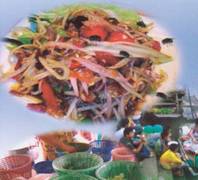FAQ (Frequently Asked Questions) About Travelers' diarrhea
Complied by: Dr. Watcharapong Piyaphanee
Produced by: Information Leaflet Committee, Faculty of Tropical Medicine, Mahidol Universit

Read NEW article : I have traveler's diarrhea: what should I do? Should I see a doctor?
What’s Travelers’ diarrhea?
Travelers' diarrhea is the most common illness affecting travelers. Every countries is at risk for travelers' diarrhea. But most cases occur in developing countries of Latin America, Africa, the Middle East, and Asia. In Thailand, prevalence of travelers' diarrhea is much lower nowadays, due to better sanitary conditions.
What causes travelers’ diarrhea?
Germ in the unclean food or drink can cause travelers' diarrhea.The most common causative agent is enterotoxigenic Escherichia coli (ETEC). Other pathogens can cause travelers' diarrhea such as campylobacter, salmonella, shigella, vibrio spp., and many kinds of intestinal parasites.
What are the common symptoms of traveler’s diarrhea?
The onset of travelers' diarrhea usually occurs within the first week of travel, but it may occur at any time while traveling. It also can occur shortly after you get home.
Diarrhea usually occurs abruptly. The illness results in increasing frequency and amount of loose or watery stool. It usually causes 5-10 bowel movements each day. Other common symptoms are abdominal pain, nausea, vomiting, bloating, and fever.
What is the natural course of disease?
Even without treatment, travelers' diarrhea usually subsides with in 2-5 days. Most cases are mind. Some cases may having dehydration, fatique, and high grade fever, mayrequired hospitalization.
What is the treatment of travelers’ diarrhea?
Whenever possible, you should have your stool checked to find the causative pathogen. Most travelers' diarrhea is treated with appropriate antibiotics and supportive treatment. Oral rehydration is recommended to replace the lost fluid and electrolytes. Hospitalized cases usually require intravenous fluid rehydration.
What about the antimotility drug?
Antimotility agents (e.g. loperamide) can reduce diarrhea by slowing the bowel movement. Since diarrhea is the body’s defense mechanism to get rid of the pathogen from the gastrointertinal tract, therefore antimotility agents may reduce the clearance of the pathogen and lead to systemic toxicity in the patient. However, these agents may be useful in reducing diarrhea while traveling.
Never use these drug in the patients with fever or mucous-bloody stool. Medical consultation is needed.
Is there any drug can be used to prevent travelers’ diarrhea?
Taking antibiotics to prevent diarrhea is not recommended. Routine antimicrobial prophylaxis increases the risk for adverse reactions to the travelers and may increase resistance to the organism.
Where can I seek for medical care if I have diarrhea?
All hospital in Thailand can take care travelers' diarrhea. Most patients can be treated as outpatients but some patients may need hospitalization. In our clinic, all patients will be requested to collect their stool to check for the pathogen. You may collect your stool before attending our clinic. Use small plastic container collecting device.
How can I prevent travelers' diarrhea?
Travelers' diarrhea is caused by a pathogen in unclean food or drink. Here are some useful tips.
- Avoid eating food or drinking beverage from uncertain origin.
- Avoid eating raw or undercooked meat and seafood.
- Avoid unpasteurized dairy products.
- Don't drink tap water.
- Bottled water is probably safe, but be sure the cap and seal are not broken.
- Bottled carbonated beverages and canned drinks are normally safe.









